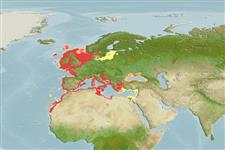Preferred temperature (Ref.
115969): 7.7 - 19.4, mean 11.4 (based on 854 cells).
Phylogenetic diversity index (Ref.
82804): PD
50 = 0.5000 [Uniqueness, from 0.5 = low to 2.0 = high].
Bayesian length-weight: a=0.00832 (0.00428 - 0.01615), b=3.05 (2.88 - 3.22), in cm Total Length, based on LWR estimates for this species & Genus-body shape (Ref.
93245).
营养阶层 (Ref.
69278): 4.1 ±0.5 se; based on diet studies.
回复力 (Ref.
120179): 低的, 最小族群倍增时间4.5 - 14 年 (Fec=9-20).
Prior r = 0.27, 95% CL = 0.16 - 0.47, Based on 1 stock assessment.
Fishing Vulnerability (Ref.
59153): Very high vulnerability (90 of 100).
Climate Vulnerability (Ref.
125649): Moderate vulnerability (40 of 100).
